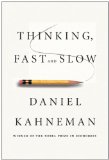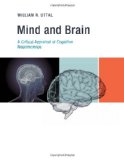October 25, 2011

Thinking, Fast and Slow by Daniel Kahneman (Farrar, Straus and Giroux)
(kindle ed.), (amazon.co.uk – 3 Nov)
Product description from the publisher:
Daniel Kahneman, recipient of the Nobel Prize in Economic Sciences for his seminal work in psychology that challenged the rational model of judgment and decision making, is one of our most important thinkers. His ideas have had a profound and widely regarded impact on many fields—including economics, medicine, and politics—but until now, he has never brought together his many years of research and thinking in one book.
In the highly anticipated Thinking, Fast and Slow, Kahneman takes us on a groundbreaking tour of the mind and explains the two systems that drive the way we think. System 1 is fast, intuitive, and emotional; System 2 is slower, more deliberative, and more logical. Kahneman exposes the extraordinary capabilities—and also the faults and biases—of fast thinking, and reveals the pervasive influence of intuitive impressions on our thoughts and behavior. The impact of loss aversion and overconfidence on corporate strategies, the difficulties of predicting what will make us happy in the future, the challenges of properly framing risks at work and at home, the profound effect of cognitive biases on everything from playing the stock market to planning the next vacation—each of these can be understood only by knowing how the two systems work together to shape our judgments and decisions.
Engaging the reader in a lively conversation about how we think, Kahneman reveals where we can and cannot trust our intuitions and how we can tap into the benefits of slow thinking. He offers practical and enlightening insights into how choices are made in both our business and our personal lives—and how we can use different techniques to guard against the mental glitches that often get us into trouble. Thinking, Fast and Slow will transform the way you think about thinking.
See also: “The Marvels and the Flaws of Intuitive Thinking” at Edge.org
Comments (0)
- cognitive science,mind,new books
October 19, 2011

Teaching Minds: How Cognitive Science Can Save Our Schools by Roger Schank (Teachers College Press, 2011)
(amazon.co.uk)
Product description from the publisher:
From grade school to graduate school, from the poorest public institutions to the most affluent private ones, our educational system is failing students. In his provocative new book, cognitive scientist and bestselling author Roger Schank argues that class size, lack of parental involvement, and other commonly-cited factors have nothing to do with why students are not learning. The culprit is a system of subject-based instruction and the solution is cognitive-based learning. This groundbreaking book defines what it would mean to teach thinking. The time is now for schools to start teaching minds!
See also: Author’s website
Comments (0)
- cognitive science,culture,mind,new books
October 3, 2011

Why Religion is Natural and Science is Not by Robert N. McCauley (Oxford University Press, 2011)
(kindle ed.), (amazon.co.uk – Jan 2012)
Product description from the publisher:
The battle between religion and science, competing methods of knowing ourselves and our world, has been raging for many centuries. Now scientists themselves are looking at cognitive foundations of religion–and arriving at some surprising conclusions.
Over the course of the past two decades, scholars have employed insights gleaned from cognitive science, evolutionary biology, and related disciplines to illuminate the study of religion. In Why Religion is Natural and Science Is Not, Robert N. McCauley, one of the founding fathers of the cognitive science of religion, argues that our minds are better suited to religious belief than to scientific inquiry. Drawing on the latest research and illustrating his argument with commonsense examples, McCauley argues that religion has existed for many thousands of years in every society because the kinds of explanations it provides are precisely the kinds that come naturally to human minds. Science, on the other hand, is a much more recent and rare development because it reaches radical conclusions and requires a kind of abstract thinking that only arises consistently under very specific social conditions. Religion makes intuitive sense to us, while science requires a lot of work. McCauley then draws out the larger implications of these findings. The naturalness of religion, he suggests, means that science poses no real threat to it, while the unnaturalness of science puts it in a surprisingly precarious position.
Rigorously argued and elegantly written, this provocative book will appeal to anyone interested in the ongoing debate between religion and science, and in the nature and workings of the human mind.
See also: Author’s website
Comments (0)
- cognitive science,culture,mind,new books
September 13, 2011
Today’s featured new release received a starred review from Kirkus Reviews:

The Thinking Life: How to Thrive in the Age of Distraction by P.M. Forni (St Martin’s Press, 2011)
(kindle ed.), (amazon.co.uk – 17 Oct)
Book description from the publisher:
Professor Forni, founder of The Civility Initiative at Johns Hopkins, is America’s civility expert. In his first two books, Choosing Civility and The Civility Solution, he taught readers the rules of civil behavior and ways of responding to rudeness. Now, in The Thinking Life, he looks at the importance of thinking in our lives: how we do it, why we don’t do enough of it and why we need to do more of it.
In twelve short chapters, he gives readers a remedy for the Age of Distraction, an age fuelled by the internet, Blackberries and cellphones, all of which make constant demands on our attention, diverting it from one thing to another. After suggesting ways we can find time to think more, Forni shows readers how we can improve our abilities of:
—Attention
—Reflection
—Introspection
—Self-control
—Positive thinking
—Proactive thinking
—Effective decision-making strategies
—Creative thinking
—Problem-solving strategies
Just as he did with civility, he puts the importance of good thinking front and center in a book as simple and as profound as his earlier works.
See also: Author’s website, Google Books preview
Comments (0)
- culture,mind,new books,psychology
September 8, 2011

Mind and Brain: A Critical Appraisal of Cognitive Neuroscience by William R. Uttal (MIT Press, 2011)
(amazon.co.uk)
Book description from the publisher:
Cognitive neuroscience explores the relationship between our minds and our brains, most recently by drawing on brain imaging techniques to align neural mechanisms with psychological processes. In Mind and Brain, William Uttal offers a critical review of cognitive neuroscience, examining both its history and modern developments in the field. He pays particular attention to the role of brain imaging–especially functional magnetic resonance imaging (fMRI)–in studying the mind-brain relationship. He argues that, despite the explosive growth of this new mode of research, there has been more hyperbole than critical analysis of what experimental outcomes really mean. With Mind and Brain, Uttal attempts a synoptic synthesis of this substantial body of scientific literature.
After an introductory discussion, he turns to his main theme: what neuroscience and psychology have contributed to each other. He considers specific empirical findings in such fields as sensation, perception, emotion and affect, learning and memory, and consciousness. For each field, he considers psychological and behavioral concerns that can help guide the neuroscientific discussion; work done before the advent of imaging systems; and what brain imaging has brought to recent research. Cognitive neuroscience, Uttal argues, is truly both cognitive and neuroscientific. Both approaches are necessary and neither is sufficient to make sense of the greatest scientific issue of all: how the brain makes the mind.
Comments (0)
- cognitive science,mind,new books







